Kenneth Atchity's Blog, page 220
January 4, 2013
Guest Post: 9 Things Every Publicist Does (Differently) That You Should Do, Too! by Penny C. Sansevieri
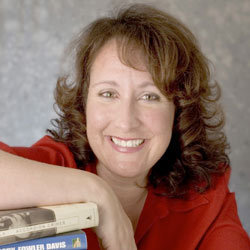
People will ask me all the time, "Why do I need a publicist?" If you have to ask the question, chances are you probably need one. Why? Because there are too many stories, too many angles, and too many opportunities you might miss by not knowing the rules of the game, so to speak. Authors, speakers, small business owners (turned authors) often launch headlong into their marketing campaign with little or no regard for the steps and the process of getting media. Some authors stumble into success after success, and that's great, but it's often not the norm. Why? Because in our zeal to tell the world about our story, we often stumble over our own efforts. We send pitches that are too long, or send them to the wrong person. Or we get a media person on the phone and fumble our elevator pitch. All of these things can rob authors of the chance to get some coverage for their book .
Over the years, a lot has changed in publicity. Players have come and gone, pitching windows have narrowed, and with so many stories vying for airtime, your 15 minutes of fame often seems like 15 seconds. To be successful, not just once but continually, you need to understand how publicity people view each facet of their job (and the pitch) and how they garner the media they do. Generally it's not one thing, it's a collection of tasks publicity people do over and over that gets them traction on a story.
Let's look at some of the things we do on an ongoing basis and how you might be able to apply them to your own marketing efforts:
Think like a journalist: This is probably the most important and the most difficult. When I say "think like a journalist" what I mean is thinking objectively and not thinking about yourself, your book, or your pitch because those don't matter. The only thing a journalist cares about is "Will this interest my readers." If you can work using that objectivity, you'll gain greater access to media, both online and off, than you could have ever imagined.
Know the rules: When I say rules, I mean not just the rules of your industry but the rules of pitching. When to pitch, who to pitch, how to pitch. A good publicist knows this, updates her information constantly (because media changes, moves, etc.) and lives and dies by these rules. Why? Get a reporter angry and you'll see what I mean. Turn in a story late and see how much media coverage you end up getting. A lot of authors think they are special and different, and the rules don't apply to them. Yes, you are special and different and yes, the rules still apply to you.
Read outside of your market: They say that, eventually, everything ties into everything. This may or may not be true for all industries, but when it comes to promotion you'd be surprised how much a ripple over there can affect what you're doing here. Reading outside of your market, mostly related to changes affecting other markets, serves a couple of purposes. First, the importance of creativity when you're pitching can't be overstated and sometimes to be creative, you have to look through your world using a different lens. By digging into and outside of your market, you'll be able to gain access to information that could affect your message long-term, or perhaps give your brain enough juice and insight to bring a new set of ideas that will create some great pitches.
Google Alerts: You can't possibly follow every thread of discussion around your topic, or know where and when it's being covered, but you do need to stay up on all of it; that's where Google Alerts comes in. Yes, there are more elaborate tracking services, but Google Alerts is a great way to know when and where your topic is being featured. Also important, you'll see who's getting quoted and which media is covering your industry.
Understand the importance of local media: Many times clients want to overlook local media. It's not as glamourous or as big as national media. Well, that may be true but there's gold in your back yard. We love local campaigns and local media loves their regional "celebrities." If you haven't done a local outreach you should. Additionally, network with local media by going to media events like Press Clubs (which anyone can register for). You never know where this will lead you, and you never know where your local contact may wind up on the media food chain. Years ago I worked with a producer for a local (small) Los Angeles station. We stayed in touch over the years and now she's one of the head producers at CNN.
Local vs. National: And speaking of local publicity -- local media loves a local angle on a national story. If you can hook your book into something that's going on nationally, then I suggest you pitch it to your local market. Good publicity people are always on the look-out for regional tie-ins, they make for great media!
Media leads: I subscribe to several media leads services and I scan them, not just for existing clients, but to note trends nationally. Doing a quick scan of leads is a fantastic way to see what's piquing the media interest. As you start doing that, you will also find that you're responding to more and more stories because you're starting to see tie-ins that you may not have seen previously (which is helped along by #3).
Realize the importance of a subject line: I know that the topic of subject lines in email pitching has been covered (a lot), but I can't state enough how important it is or how much time a good publicist can spend agonizing over it. Don't just willy-nilly point and click your way through your media pitching -- subject lines are extremely significant, and most publicity people I know spend a lot of time crafting, redrafting, editing and tweaking them. You should, too.
It's all about relationships: Once you start getting media, remember that staying in touch with the person who interviewed you is important. Find them on LinkedIn, thank them for the story they did on you (I still send hand-written thank you notes) and then stay in touch a few times a year. Perhaps you can comment on a story they did or send them a quick update or a copy of your latest book. If you can become a reliable media source for someone, you'll likely always be in their rolodex even when they move on. Just like the example I gave above, media can move, and if you're lucky, your information will keep moving with them.
Being a publicist is more than just knowing how to craft a snazzy email, it's a process and an ongoing effort. If done right, you can really pull in a lot of great mentions, features and even reviews. Building media relationships takes a while, and there are no shortcuts, but if done effectively, these relationships can grow and flourish throughout your career. And remember: Media loves media. The more you get, the more you'll get. Know the rules, honor the rules and perhaps if you're lucky, the media will beat a path to your door.

Published on January 04, 2013 00:00
January 2, 2013
STORY MERCHANT CLIENT NICK BAZAN
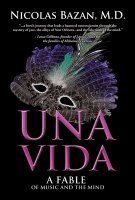 The Arts of Neuroscientists: Nicolas Bazan
The Arts of Neuroscientists: Nicolas BazanBy Andrew Kahn
The Dana Alliance for Brain Initiatives, a nonprofit organization of more than 300 leadingneuroscientists, works to advance public awareness about the progress and promise of brain research. As eminent neuroscientists, Alliance members harbor an intense passion for scientific research and progress, but many of our members also have passions outside neuroscience. This is the third in a series of conversations with Alliance members about their artistic pursuits.

Nicolas Bazan in his lab at LSU.
Nicolas Bazan has enough pursuits outside of the lab to warrant an entire series of “The Arts of Neuroscientists.” Bazan has his hand in music, literature, and culinary endeavors, turning hobbies into successful business ventures. Despite spending almost all of his time leading the neuroscience lab at LSU’s School of Medicine in New Orleans, Bazan somehow found time to write a book, create a wine, and deepen his connection to music.
Bazan’s passion for music started as a young boy in Argentina, when his aunt would walk him to his piano lessons. On the way to one of these lessons, his aunt suffered a grand mal seizure in the middle of the street. It was a traumatic experience for Bazan. “The seizure turned her brain against her body, which turned my aunt into a different person in her last moments. It was like watching a movie in a language I didn’t understand. I saw things that made no sense to my six-year-old self, and I was just frozen in place while they happened. After that I refused to take piano lessons. I completely switched off that part of me, because I couldn’t bear to think about what happened to my aunt.”
In a way, though, Bazan constantly thought about what had happened. Even if he didn’t make the connection at the time, Bazan enrolled in medical school in Argentina partly to untangle mysteries about the brain. After his training in his first laboratory in Toronto at the age of 26, he discovered unique neurochemical changes in the brain at the onset of experimental seizures and stroke. “It’s almost like I was doing the work for my aunt or people like her,” Bazan now says of his research. “I found that I could turn that switch back on to music, literature, and art.”
For some people, that might mean listening to old records or taking up an instrument. For Bazan, it meant writing a novel that connects music and neuroscience: Una Vida: a Fable of Music and the Mind (published in 2009). “It’s about a New Orleans street singer with Alzheimer’s who crosses paths with a neuroscientist on a personal quest of discovery. I tried to write about the sad but beautiful way that a person with so much music and talent in her soul would see the world once affected by Alzheimer’s.”
Bazan moved to New Orleans in 1981 and was immediately captivated by the culture, particularly jazz, a form of music he had always treasured. “Music is everywhere in this city, and so it’s also a part of me,” Bazan says. It is clear that the main character in his book, Dr. Alvaro Cruz, shares Bazan’s passion to conquer Alzheimer’s through research. The novel, which reflects Bazan’s deep knowledge of the history of jazz, has received much critical acclaim, and a film adaptation is in the works. “As suggested by Yadi Dudai at the Weizmann Institute, I feel that movies, more than other art forms, activate specific brain circuits linked to mental and emotional time travel as well as memory systems, all of which enhance the human experience,” said Bazan, who co-wrote the screenplay.
Bazan, who sits on the board of the New Orleans Opera, is collaborating with legendary opera singer Maestro Placido Domingo for a fundraiser during the Society for Neuroscience annual meeting, held this year in New Orleans. To benefit Bazan’s lab, Domingo will lead the fundraiser at noon Saturday, Oct. 13, the 50th anniversary of Domingo’s first New Orleans performance.
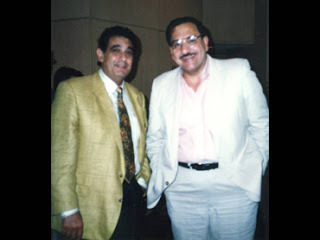
Nicolas Bazan (right) and Placido Domingo in March 1992 in Adelaide, Australia
Bazan is currently a Senate Member of the German Center for Neurodegenerative Diseases; he understands the toll Alzheimer’s can take not just on those with the disease but also on caretakers and the economy. He is particularly interested in NPD1, a protective mediator made in the brain on demand after injury or at the onset of seizures or neurodegenerations. He and his colleagues discovered NPD1 in 2004 and coined the term neuroprotectin D1. In 2005, Bazan discovered that this mediator is diminished by a factor of 25 in the brains of people with early Alzheimer’s.
Bazan made a connection between this protective chemical and the anti-oxidants in wine. Dissatisfied with the amount of antioxidants in most wines, Bazan joined forces with a winemaker in Oregon, Dr. Mark Wahle, to create several pinot noirs (one is named Haydee, after Bazan’s wife, others are Una Vida, Mis Hijos and Mis Nietos) with increased levels of antioxidants. “It’s a wonderful mix of science and culture,” Bazan says of his creation, though he may as well have been talking about his entire life.

Published on January 02, 2013 00:00
December 29, 2012
Larry Wilson: Books they'd like to find under the tree

Larry Wilson's Public Eye blog More
WHAT do we want to see under the tree?
Book-shaped boxes, containing books.
Why?
They contain the world's best stories, and they are a lot better looking - in the hand, on the bookshelf - than a Kindle file.
First, you could get a jump on Pasadena's 11th One City, One
Story community read in March with Karen Thompson Walker's fabulous "The
Age of Miracles." The novel is set in North County San Diego in a time
much like the present, except that the Earth's rotation has dramatically
slowed. The days are longer, and so are the nights. It's either about
the environmental havoc that ensues - beached whales, high tides - or
the ordinary havoc of being a teenage girl like our heroine Julia. Both
amount to the same. I loved this story.
The romance readers in your family, and the Italophiles, want
San Marinan Terry Stanfill's second novel "Realms of Gold," set in
opulent Venice and ancient Celtic Burgundy - those Celts were everywhere
- among Americans and Italian-Americans. As in Lian Dolan's "Helen of
Pasadena," the hunk is an archaelogist, apparently the sexiest grove of
academe. You'll learn tons about the Bronze Age, the Iron Age, Jason and
the Argonauts, mythic Avalon and a millenia-old mystery.
Read more: http://www.pasadenastarnews.com/news/ci_22235125/larry-wilson-books-theyd-like-find-under-tree?source=rss#ixzz2GHeCdvoL

Published on December 29, 2012 00:00
December 28, 2012
HUFFINGTON POST: Merry Christmas From the Vatican by Kenneth Atchity
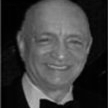
Ken Atchity
One of many dismaying ecclesiastical events of my formative years was the Catholic Church's sudden 1984 announcement that eating meat on Fridays was no longer a mortal sin. Bad enough all those hamburgers and hotdogs sacrificed to mackerel and catfish. What really got me was the fate of those uncounted millions of souls who had been consigned to hellfire for all eternity by St. Peter's keys to the kingdom. Would they get a reprieve and be allowed to migrate heavenward, albeit a bit blackened around the edges? Apparently not! If one doctrine can so arbitrarily be discarded after centuries of confessional enforcement, what, I wondered, about so many others?
Now archconservative Pope Benedict XVI, in his latest book, "Jesus of Nazareth: The Infancy Narratives," admits a few other things never made a lot of sense; infallibly ex cathedra, has pronounced an end to them. First, the year of Jesus' birth, known for millennia now as anno domini, "year of our lord," "A.D.," he admits is problematic. Being a close critic of the written word it never made sense to me that King Herod tried to kill the infant Jesus when secular history incontrovertibly records that Herod himself died in 4 B.C. "Never mind," the nuns and priests told me, "some things are mysteries and better not questioned." I suppose we're still asked to ignore the actual historical event, which was a senatorial decree to slay all male children on the birth of Octavian (later to be called Augustus) in 63 B.C. In "The Infancy Narratives," His Holiness admits that the Jesus birth year of record has been mistaken for nearly 15 centuries due to a sixth-century clerical error and should be reassigned to 7-6 B.C.
Second: It always seemed an uncanny convenience to me that the sacred date of our annual Christmas celebration of the savior's birth, coinciding with the winter solstice, is found in nearly every single ancient pagan religion -- some predating Christianity by more than a millennium. Mithra, Horus/Osiris, Dionysus and the Phrygian savior Attis all share the same birth date. Even the Christmas tree can be traced at least as far back as Attis rituals circa 400 B.C. (imported to Rome by conquests). The ritual involved the cutting down of a pine tree and installing it, branches covered with candles to shine the way home through the darkening days. All that said to me is that the story of Jesus was founded in ancient myth -- which made it all the more momentous as far as I was concerned. Now the Pope tells us that we actually have no idea when exactly Jesus was born, and that, in fact, December is just a solstice-appropriate date that need not be taken literally.
The same Pope, by the way, once declared that the greatest problem with Christian doctrine was our scholarly inability to make the historicity of Jesus credible: "the so-called historical Jesus is a mythological figure, self-invented by various interpreters." But, then, Cardinal Joseph Ratzinger wasn't pope yet when he said that .
Third: On my knees each year marveling at nativity cribs -- which ranged in size from the six-inch one beneath the family Christmas tree to the full life-sized crib on Gilham Road in Kansas City or in St. Peter's Square, both of the latter generally involving live animals -- I couldn't help wondering if poor Mary, Joseph and Jesus really had to deal with the rank breath of camels, ox, ass, sheep and cows. Now, it turns out, this Pope doesn't believe the camels, ass and oxen were literally there either. Thank God believing in them was never an issue of mortal or even venial sin!
Fourth: There's also an awful lot of talk in the Pope's new book about Augustus Caesar, bringer of universal peace, divus filius divi, "God and son of God," being called soter ("savior") -- a "theological figure" who arranged that history be started from his reign, the true origin of the term anno domini. Is there indeed a hitherto unadmitted "link between Jesus and Augustus"? After all, one of Augustus' many epithets is Jasius -- after a Trojan founding father of Rome.
Maybe His Holiness is simply intent on redeeming Christianity from the literalists who hijacked it two millennia ago and who never seemed to notice that their literalist beliefs are self-contradictory.
As we reach a time in American history when fewer than 50 percent of the U.S. population claims to believe in the Christian God, the Pope's scholarly conclusions illustrate more clearly than ever that it's not necessary to believe literally in any organized religion's founding story.
All religions are based on universal myth: the myth that humans are capable of aspiring to the divine urges within human nature as much as we are capable of sinking into the bestial ones. That is what the ancient fish diagram (two conjoined circles with the area of conjunction forming the fish), first popularized by the Egyptians, symbolizes. The fish in the image is formed by the intersection of the two natures, divine and bestial, within the human species. That is what the term christ originally meant long before it was attached by historical literalists to a carpenter who supposedly walked the dusty roads of Judea. At the end of the day does it really matter whether a man named Jesus actually lived, when the mythic idea of Jesus resonates through the ages, shining through the darkness of the evil that haunts us, and enlivening our hearts with (nonsectarian) Christmas hope and joy?
The characters in Dr. Atchity's latest book, 'The Messiah Matrix' (www.messiahmatrix.com), discover an alternative theory of Christian origins in the pontifex maximus of imperial Rome. (@kennja)
Follow Ken Atchity on Twitter:
www.twitter.com/kennja

Published on December 28, 2012 00:00
Merry Christmas From the Vatican

Ken Atchity
One of many dismaying ecclesiastical events of my formative years was the Catholic Church's sudden 1984 announcement that eating meat on Fridays was no longer a mortal sin. Bad enough all those hamburgers and hotdogs sacrificed to mackerel and catfish. What really got me was the fate of those uncounted millions of souls who had been consigned to hellfire for all eternity by St. Peter's keys to the kingdom. Would they get a reprieve and be allowed to migrate heavenward, albeit a bit blackened around the edges? Apparently not! If one doctrine can so arbitrarily be discarded after centuries of confessional enforcement, what, I wondered, about so many others?
Now archconservative Pope Benedict XVI, in his latest book, "Jesus of Nazareth: The Infancy Narratives," admits a few other things never made a lot of sense; infallibly ex cathedra, has pronounced an end to them. First, the year of Jesus' birth, known for millennia now as anno domini, "year of our lord," "A.D.," he admits is problematic. Being a close critic of the written word it never made sense to me that King Herod tried to kill the infant Jesus when secular history incontrovertibly records that Herod himself died in 4 B.C. "Never mind," the nuns and priests told me, "some things are mysteries and better not questioned." I suppose we're still asked to ignore the actual historical event, which was a senatorial decree to slay all male children on the birth of Octavian (later to be called Augustus) in 63 B.C. In "The Infancy Narratives," His Holiness admits that the Jesus birth year of record has been mistaken for nearly 15 centuries due to a sixth-century clerical error and should be reassigned to 7-6 B.C.
Second: It always seemed an uncanny convenience to me that the sacred date of our annual Christmas celebration of the savior's birth, coinciding with the winter solstice, is found in nearly every single ancient pagan religion -- some predating Christianity by more than a millennium. Mithra, Horus/Osiris, Dionysus and the Phrygian savior Attis all share the same birth date. Even the Christmas tree can be traced at least as far back as Attis rituals circa 400 B.C. (imported to Rome by conquests). The ritual involved the cutting down of a pine tree and installing it, branches covered with candles to shine the way home through the darkening days. All that said to me is that the story of Jesus was founded in ancient myth -- which made it all the more momentous as far as I was concerned. Now the Pope tells us that we actually have no idea when exactly Jesus was born, and that, in fact, December is just a solstice-appropriate date that need not be taken literally.
The same Pope, by the way, once declared that the greatest problem with Christian doctrine was our scholarly inability to make the historicity of Jesus credible: "the so-called historical Jesus is a mythological figure, self-invented by various interpreters." But, then, Cardinal Joseph Ratzinger wasn't pope yet when he said that .
Third: On my knees each year marveling at nativity cribs -- which ranged in size from the six-inch one beneath the family Christmas tree to the full life-sized crib on Gilham Road in Kansas City or in St. Peter's Square, both of the latter generally involving live animals -- I couldn't help wondering if poor Mary, Joseph and Jesus really had to deal with the rank breath of camels, ox, ass, sheep and cows. Now, it turns out, this Pope doesn't believe the camels, ass and oxen were literally there either. Thank God believing in them was never an issue of mortal or even venial sin!
Fourth: There's also an awful lot of talk in the Pope's new book about Augustus Caesar, bringer of universal peace, divus filius divi, "God and son of God," being called soter ("savior") -- a "theological figure" who arranged that history be started from his reign, the true origin of the term anno domini. Is there indeed a hitherto unadmitted "link between Jesus and Augustus"? After all, one of Augustus' many epithets is Jasius -- after a Trojan founding father of Rome.
Maybe His Holiness is simply intent on redeeming Christianity from the literalists who hijacked it two millennia ago and who never seemed to notice that their literalist beliefs are self-contradictory.
As we reach a time in American history when fewer than 50 percent of the U.S. population claims to believe in the Christian God, the Pope's scholarly conclusions illustrate more clearly than ever that it's not necessary to believe literally in any organized religion's founding story.
All religions are based on universal myth: the myth that humans are capable of aspiring to the divine urges within human nature as much as we are capable of sinking into the bestial ones. That is what the ancient fish diagram (two conjoined circles with the area of conjunction forming the fish), first popularized by the Egyptians, symbolizes. The fish in the image is formed by the intersection of the two natures, divine and bestial, within the human species. That is what the term christ originally meant long before it was attached by historical literalists to a carpenter who supposedly walked the dusty roads of Judea. At the end of the day does it really matter whether a man named Jesus actually lived, when the mythic idea of Jesus resonates through the ages, shining through the darkness of the evil that haunts us, and enlivening our hearts with (nonsectarian) Christmas hope and joy?
The characters in Dr. Atchity's latest book, 'The Messiah Matrix' (www.messiahmatrix.com), discover an alternative theory of Christian origins in the pontifex maximus of imperial Rome. (@kennja)
Follow Ken Atchity on Twitter:
www.twitter.com/kennja

Published on December 28, 2012 00:00
December 26, 2012
Guest Post: Tips on Writing Fantasy by Nadine Maritz
If you type Fantasy Writing into any search engine these days you’re met with a gazillion links leading to every possible tip and trick to succeed at writing. It can be a little overwhelming so, since I’ve started writing my set of novels, I thought I’d let all the other first timers out there know what I’ve learned on my adventure. Please note, though, this is my opinion only.
I write fantasy, but I wanted to start out by giving more general tips that should apply to any genre. First off, let’s look at some of the things I wish I’d known before I started writing.
1. If you’re a first timer with no background in writing I suggest reading everything you can lay your hands on when it comes to writing.
2. Assess what you want from writing. Do you want to get published more than anything in the entire world or are you really just writing for your own pleasure? If it’s the latter and you’re not honest with yourself upfront it could end up costing you a crap load of money and only giving you a very low morale in return.
3. Know from the word go that in order to succeed you will need to put a lot into it. Writing can be fairly expensive—especially these days, when an author is expected to market themselves for the most part—and it’s never easy. It’s an art, and in order to succeed you will need determination, patience and, for some, money.
4. Write an outline, create your characters and decide what you want to achieve in your stories. Now, I know this doesn’t work for everyone, but it does help me. By doing this I know exactly what to expect from my characters and I stay focused on where I want the plot to go.
5. Buy yourself some big girl panties (or suitable gender-specific underwear.) You need to know from the word go that not everyone will like your ideas, your style, your characters or your plot. Thick skin is a necessity.
6. Get an editor. Not everyone needs one, not everyone can afford one, but if you’re like me it’s a necessity. Also, to fit my sparkling personality, I didn’t require just anyone. I had to look for someone who is experienced in my genre, liked my idea and was willing to invest time and energy to help me polish my story.
7. Network. Networking is more important than ever in today’s market. I’d say even if you can’t meet with people face-to-face it’s important to get active on social networking. That way you build up a relationship with fellow authors, publishers, agents and potential readers.
Finally, since fantasy is my passion, as I feel it’s one of the most creative genres where you get to create new worlds, I wanted to end off by talking about what works for me, writing in that genre specifically.
1. Setting, in terms of time, needs to be appropriate and convincing when it comes to technology.
2. Don’t expect readers, agents or publishers to visualize something that’s unconvincing. What publishers will look for is specific—a good story, a clear plot structure, well-developed characters and dialogue.
3. Start off with your world. This world needs to be pretty fleshed out before you can move onto the next step.
4. Create maps—you don’t need to get it all coloured up for publishing but by creating this you have a general concept of where stuff takes place.
5. Magic—if your world involves magic, you will need to create—and stick to—rules for it before you start writing.
6. Try to avoid clichés. Parameters have pretty much been set when it comes to dwarves and fairies etc. Focus on developing something new yet realistic.
7. Characterization in fantasy is very important. Unless your world is specifically built to accommodate it, you can’t take a sailor from the 1400s and put him into a 21st century space shuttle.
Remember to write what you love. Know that your first draft will never be your best draft, writing will take time no matter what genre you focus on and, if you take these points into consideration and are prepared to put in the time and effort, I’d like to believe you, and I, will succeed!
 Nadine Maritz ( formerly known as Cloete) was born in 1981 in the heart
Nadine Maritz ( formerly known as Cloete) was born in 1981 in the heart of Johannesburg, South Africa’s City of Gold. A variety of influencing
factors and individuals has helped shape her journey towards writing
this her first novel.
Nadine's Novel “My Addiction: My Gift; My Curse,” is a South African contemporary fiction novel that reflects on the relatable day to day livelihood of an Afrikaans vampire nurse that works in an old age home. This is the first novel of a series.
http://my-addictionbooks.blogspot.com

Published on December 26, 2012 00:00
December 24, 2012
December 21, 2012
[via Oscar Castro-Neves]
All that remains of communities and civilizations, All
that remains of their worth and dignity Exists in the art they leave.
~ "William Carlos Williams"

Published on December 21, 2012 00:00
December 20, 2012
Ken Atchity Author and Story Merchant with Host Yi Tian on ActorsE Chat
Video streaming by Ustream
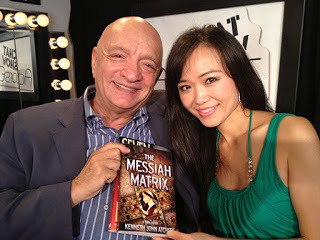
Ken Atchity Author and Story Merchant with Host Yi Tian on ActorsE Chat
The Messiah Matrix Website
ActorsE Chat is a Live Chat Show on Actors Entertainment, a channel on the Actors Podcast Network, a Pepper Jay Production

Ken Atchity Author and Story Merchant with Host Yi Tian on ActorsE Chat
The Messiah Matrix Website
ActorsE Chat is a Live Chat Show on Actors Entertainment, a channel on the Actors Podcast Network, a Pepper Jay Production

Published on December 20, 2012 00:00
December 19, 2012
NEW DISCIPLINE FROM JEFF RIVERA FREE TO STORY MERCHANT FRIENDS
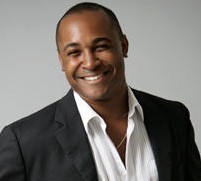
Success as a writer is 90% work and 10% talent. No matter how talented you are, if you do not do the work, if you do not roll up your sleeves, none of your dreams for greatness as a writer can ever come true. That's just reality.
The challenge is that today's writer is, quite frankly, distracted. It goes beyond simply wanting to wash your windows and walk the dog instead of writing.
Nowadays, the biggest time zapper is the Internet. Whether it's Facebook, Twitter or checking your email 400 times a day, every second you're playing on the Internet is one step further from your goal as a writer. In my book, A Writer's Time: Making the Time to Write, I talk about how imperative this step is.
That's why when I was introduced to a new tool my good friend Jeff Rivera is beta-testing, I had to share it with you. It is a software that will prevent you from using the Internet without finishing your daily word count.
If you're serious about your commitment to writing, I highly recommend it.
Download Write the Damn Thing now!

Published on December 19, 2012 00:00




